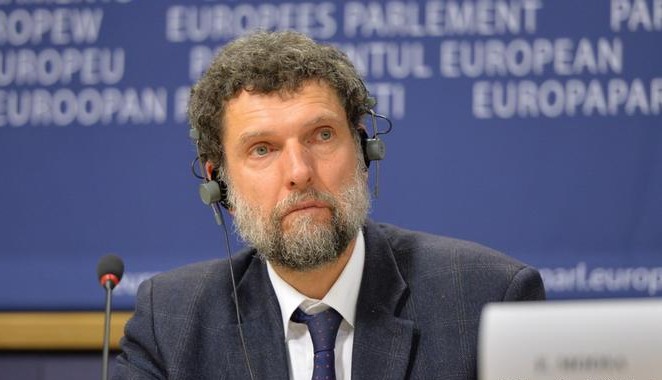A group of nine nongovernmental organizations including Human Rights Watch and Amnesty International said the prosecution of rights defender and businessman Osman Kavala and four codefendants in connection with mass protests a decade ago was unfair and essentially a political show trial from the beginning, calling for an urgent international response.
The rights groups’ statement was issued on Tuesday, ahead of an Oct. 12 debate calling for Kavala’s release at the Parliamentary Assembly of the Council of Europe (PACE).
“The five have been punished for the legitimate exercise of their rights to freedom of expression, association and peaceful assembly,” said the rights organizations, which also include ARTICLE 19, European Democratic Lawyers (AED), European Lawyers for Democracy and Human Rights (ELDH), International Commission of Jurists, International Federation for Human Rights (FIDH), PEN International and Turkey Human Rights Litigation Support Project.
Turkey’s Supreme Court of Appeals on Sept. 28 upheld the convictions, the fact that the European Court of Human Rights (ECtHR) had previously found no basis for detention or trial and ordered Kavala’s immediate release notwithstanding.
The rights groups said Turkey’s European and international allies, both unilaterally and through intergovernmental organizations, including the Council of Europe, the European Union and the United Nations, should address “this injustice as a matter of urgency.”
“They should treat the case as a priority human rights matter in their mutual relations with Turkey, and push for the swift and full implementation of the European Court’s’ judgments, including for the defendants’ immediate release.
“They should firmly condemn the abuse of criminal law against activists, human rights defenders, journalists and others in politically motivated cases. Robust efforts are essential to ensure that Turkey respects and abides by its human rights obligations and rule of law principles, which are currently being flouted with impunity.”
Kavala was sentenced to life in prison without parole, convicted of attempting to overthrow the government on false allegations that he organized and financed the 2013 İstanbul Gezi Park protests against a government urban development project. Four co-defendants – Çiğdem Mater, Can Atalay, Mine Özerden and Tayfun Kahraman – received 18-year sentences for allegedly aiding Kavala, while the court quashed the 18-year sentences of Mücella Yapıcı, Hakan Altınay and Yiğit Ekmekçi and ordered Yapıcı and Altınay’s release pending retrial.
“By ignoring these judgments and Turkey’s human rights obligations, the Court of Cassation is doubling down on the deep injustice of this case that dramatically demonstrates how far Turkey has deviated from the rule of law,” said Helen Duffy of the Turkey Human Rights Litigation Support Project. “The trial has not only led to grave violations of the rights of Kavala and the others, but it provided a chilling example of how Turkey’s justice system has become a tool of political repression.”
The statement said although President Recep Tayyip Erdoğan and Turkish government officials repeatedly state that Turkish courts are independent, the trial of Kavala and his codefendants exposes those claims for the falsehood they are and demonstrates how in key cases of interest to the president, prosecutors and courts blatantly do his bidding.
“This trial cynically opened six years after the Gezi Park protests with the malevolent intent of casting them as the outcome of a grand conspiracy by one man, Osman Kavala,” said Hugh Williamson, Europe and Central Asia director at Human Rights Watch. “To achieve this the prosecution and the courts blatantly had to ignore all the evidence of spontaneous mass protests in which the vast majority of protesters committed no violence and exercised their lawful rights to freedom of expression and assembly.
“The top appeals’ court’s 78-page verdict reiterates the prosecution’s allegations in the February 2019 indictment, though the ECtHR ruled twice that the indictment offered insufficient evidence to justify Kavala’s detention, prosecution or conviction, and by inference, the other defendants.”



